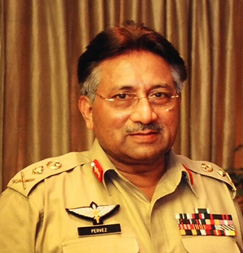In what country in the world have the lawyers, led by a sacked chief justice of the Supreme Court, staged a revolt against the government and won? Where else could such a wholly improbable set of facts occur? In Pakistan, of course.
For those who pay serious attention to counterterrorism issues, Pakistan—not Iran or Syria–is broadly recognized as the most troubling spawning grounds for terrorist threats. Because of the Bush Administration’s special relationship with Pakistani strongman Pervez Musharraf, however, Washington never portrays the situation there with the gravity that it truly merits. It was therefore refreshing to watch a recent Democratic presidential debate in which the candidates focused in on Pakistan and noted the gross foreign policy missteps by the Bush Administration that have marked this relationship and have seriously undermined national, and global security. Several of these candidates seem to get it, in a way that Bush himself never has.

This week there’s much afoot in Pakistan and the news is not all bad. Domestic criticism, complaints from Afghanistan’s president, and intelligence community analyses were all united on one point: Musharraf is in trouble. In terms of security and law enforcement, he has lost his grip on half of his country, and terrorist organizations, including Al Qaeda and Islamic militant organizations like the Taliban, are operating freely in Baluchistan and the North West Frontier Province. And the relationship between the Pakistani Interservice Intelligence (ISI) and many of these organizations continues to be extremely suspicious.
The Bush Administration’s attitudes towards Pakistan had been marked by lethargy and indulgence. However, they finally have begun to take action, and one aspect of the changed policy has been positive: pressure was brought to bear on Musharraf to broaden his political base to create a more viable government. This inevitably meant feeling out the possibility of a political alliance with Benazir Bhutto and her People’s Party of Pakistan (PPP). Today Musharraf is very close to such a deal–although its exact parameters have not been shaped, and such a plan could still fail. The major stumbling point is Bhutto’s insistence that Musharraf take off his uniform and relinquish his position as Army chief of staff. This Musharraf refuses to do, since he sees in it an effort to separate him from his power base and to give Bhutto the upper hand in a coalition. Many of the PPP leaders seem to prefer opposition and are suspicious of Bhutto, wondering whether she is pursuing a deal for her own advancement or for that of PPP. Nevertheless, a Musharraf-Bhutto alignment would give Musharraf’s government the broader platform and legitimacy that it’s been missing ever since Musharraf’s rise to power. So it would have to be viewed as something positive, though hardly a panacea for the nation’s problems.
The recent threat by Musharraf to declare a state of emergency has to be understood in the context of the Bhutto-Musharraf talks. In effect, it was Musharraf saying he didn’t have to make this deal, as he had other options. Carlotta Gall and Salman Masood of the New York Times report from Islamabad that the threat was diffused after a fifteen-minute phone call from Condoleezza Rice:
“She thought it was an opportune moment to talk about a couple of things,” Mr. McCormack said without elaborating. By the time of the conversation, Pakistan’s minister of state for information and broadcasting, Tariq Azim Khan, had said that General Musharraf was not ruling out declaring an emergency, which would give him sweeping powers to restrict freedom of movement and assembly, to suspend Parliament and to curtail the activities of the courts.
Such a step, officials in Washington fear, would further inflame the region and open the Bush administration to additional criticism from democracy advocates who say it has already been too willing to turn a blind eye toward General Musharraf’s failure to restore civilian rule. In Pakistan, opponents of emergency rule, including some inside the government, warned that it would push the country into a deeper crisis, as the opposition parties, the judiciary, lawyers and civil society would react strongly against it.
This is an increasingly rare example of U.S. diplomatic influence being wielded in a timely and effective way, and Rice is to be congratulated for it. But the challenges coming out of Pakistan are enormous.
Still, a political alignment between Musharraf and opposition leader Bhutto seems increasingly likely by the end of the year. This deal reflects a positive influence being wielded by the West, and it reflects Musharraf’s own internal assessment that he can’t govern by himself, and that the Islamic radicals with whom he had previously aligned himself are ungovernable and ultimately more his enemies than his friends. That left the more moderate PPP as the most practical alternative. Inevitably, Musharraf will be giving up some of his own power, which will be a good thing if the government he heads commands broader respect.
But all of this is just a prelude. The real test of Pakistan’s future viability remains in the zones which have been essentially ungovernable from colonial times: Baluchistan and the North West Frontier Province. If America and Europe have an urgent security concern in Pakistan, it is that effective policing and monitoring operations be introduced into this lawless zone. This is one of the ultimate tests of ingenuity in counterterrorism measures. And on this point, Musharraf and the Bush Administration are dangerously far behind the curve.


